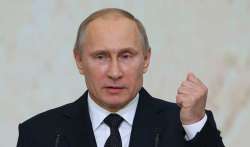Panama Papers accurate, says Vladimir Putin
Russian President Vladimir Putin has acknowledged the authenticity of Panama Papers revelations, but said they were not proof of any wrongdoing.

New Delhi: Russian President Vladimir Putin has acknowledged the authenticity of Panama Papers revelations, but said they were not proof of any wrongdoing.
“First of all, however strange it may seem, the information is accurate,” he said, referring to what was in the leak.
He also claimed that news reports on the trove of leaked documents, from the law firm Mossack Fonseca, were an attempt to “muddy the waters” at the behest of the US government and New York-based investment bank Goldman Sachs, but he gave no details to back up his assertions.
“The leaks just serve to muddy the waters by raising the possibility that “money from these offshores goes to some officials, including to the president,” Putin said. Those who investigated the Panama papers were “wide of the mark,” he insisted.
Putin, in a nearly four-hour question-and-answer session, also took aim at the international team of journalists that produced the Panama Papers report detailing shell companies, tax havens and financial dealings by political figures and others around the world.
He alleged that “staff of US official institutions” were working on the disclosures, which he called “acts of provocation” ahead of Russia’s parliamentary elections in September.
Information leaked from a law firm based in Panama showed the efforts of wealthy people around the world to hide money and avoid taxes. According to the documents, Putin’s associates, notably cellist Sergei Roldugin, secretly shuffled as much as $2 billion through banks and shadow companies.
Meanwhile, World Bank has said that Panama Papers revelations are hurting public trust and may make ordinary citizens more reluctant to pay the taxes needed to fund roads, schools and other government functions.
World Bank Managing Director Mulyani Indrawati called on policymakers to cooperate by crafting some stronger laws. The money sheltered in Panama also represents a big chunk of some countries' economies.